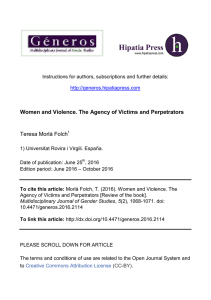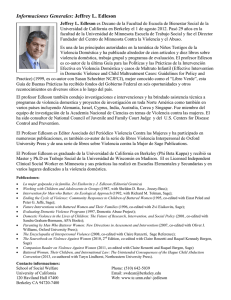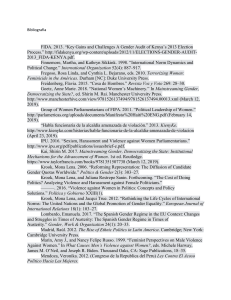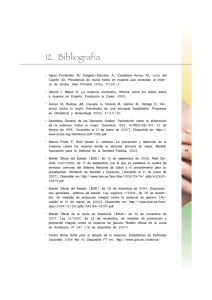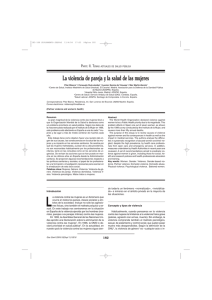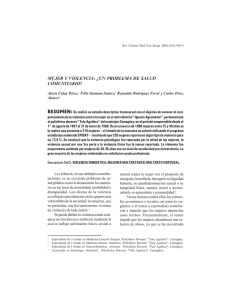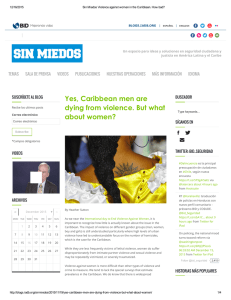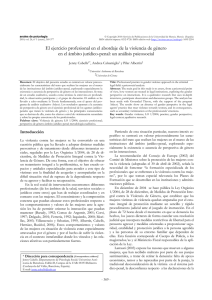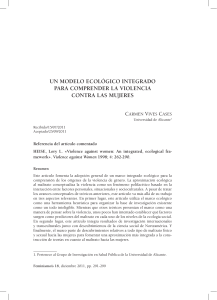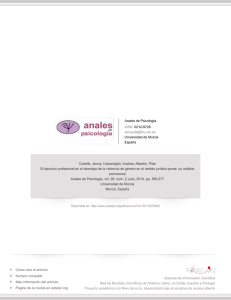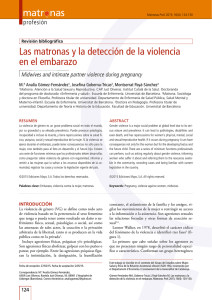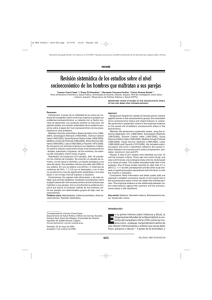mujer y violencia doméstica women and domestic violence mujeres
Anuncio
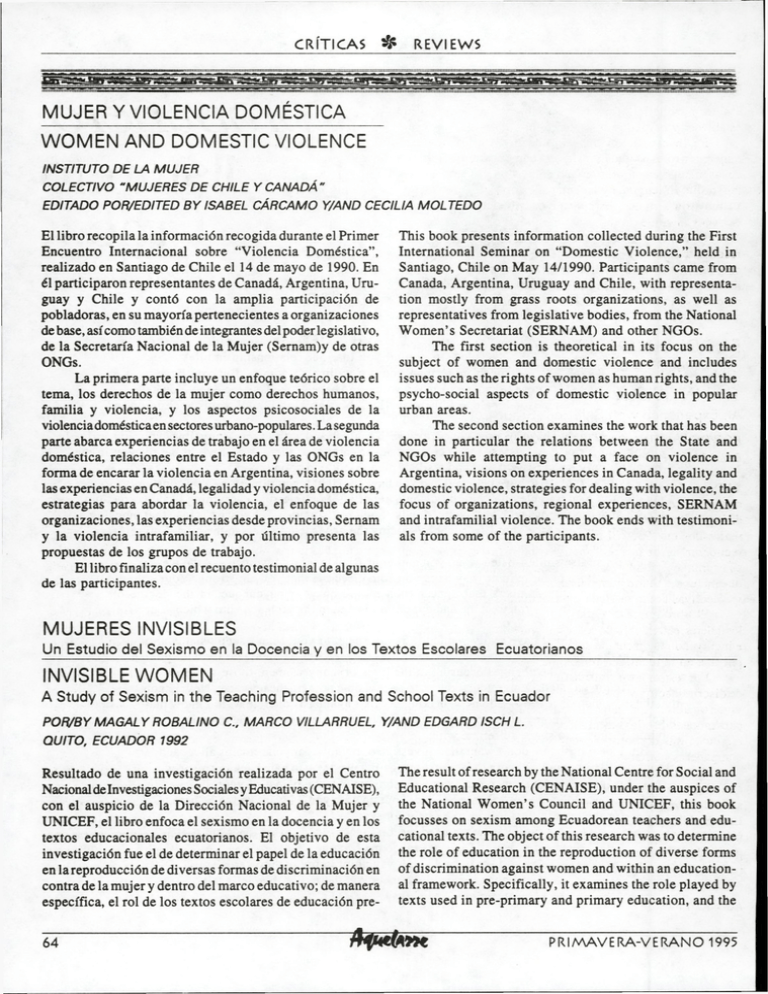
CRÍTICAS $ REVIEWS MUJER Y VIOLENCIA DOMÉSTICA WOMEN AND DOMESTIC VIOLENCE INSTITUTO DE LA MUJER COLECTIVO "MUJERES DE CHILE Y CANADÁ" EDITADO POR/EDITED BY ISABEL CÁRCAMO Y/AND CECILIA MOLTEDO El libro recopila la información recogida durante el Primer Encuentro Internacional sobre "Violencia Doméstica", realizado en Santiago de Chile el 14 de mayo de 1990. En él participaron representantes de Canadá, Argentina, Uruguay y Chile y contó con la amplia participación de pobladoras, en su mayoría pertenecientes a organizaciones de base, así como también de integrantes del poder legislativo, de la Secretaría Nacional de la Mujer (Sernam)y de otras ONGs. La primera parte incluye un enfoque teórico sobre el tema, los derechos de la mujer como derechos humanos, familia y violencia, y los aspectos psicosociales de la violencia doméstica en sectores urbano-populares. La segunda parte abarca experiencias de trabajo en el área de violencia doméstica, relaciones entre el Estado y las ONGs en la forma de encarar la violencia en Argentina, visiones sobre las experiencias en Canadá, legalidad y violencia doméstica, estrategias para abordar la violencia, el enfoque de las organizaciones, las experiencias desde provincias, Sernam y la violencia intrafamiliar, y por último presenta las propuestas de los grupos de trabajo. This book presents information collected during the First International Seminar on "Domestic Violence," held in Santiago, Chile on May 14/1990. Participants came from Canada, Argentina, Uruguay and Chile, with representation mostly from grass roots organizations, as well as representatives from legislative bodies, from the National W o m e n ' s Secretariat (SERNAM) and other NGOs. The first section is theoretical in its focus on the subject of women and domestic violence and includes issues such as the rights of women as human rights, and the psycho-social aspects of domestic violence in popular urban areas. The second section examines the work that has been done in particular the relations between the State and NGOs while attempting to put a face on violence in Argentina, visions on experiences in Canada, legality and domestic violence, strategies for dealing with violence, the focus of organizations, regional experiences, SERNAM and intrafamilial violence. The book ends with testimonials from some of the participants. El libro finaliza con el recuento testimonial de algunas de las participantes. MUJERES INVISIBLES Un Estudio del S e x i s m o en la Docencia y en los Textos Escolares Ecuatorianos INVISIBLE WOMEN A Study of S e x i s m in t h e Teaching Profession and School Texts in Ecuador POR/BY MAGALY ROBALINO C.. MARCO VILLARRUEL. Y/AND EDGARD ISCH L. QUITO, ECUADOR 1992 Resultado de una investigación realizada por el Centro Nacional de Investigaciones Sociales y Educativas (CENAISE), con el auspicio de la Dirección Nacional de la Mujer y UNICEF, el libro enfoca el sexismo en la docencia y en los textos educacionales ecuatorianos. El objetivo de esta investigación fue el de determinar el papel de la educación en la reproducción de diversas formas de discriminación en contra de la mujer y dentro del marco educativo; de manera específica, el rol de los textos escolares de educación pre64 The result of research by the National Centre for Social and Educational Research (CENAISE), under the auspices of the National W o m e n ' s Council and UNICEF, this book focusses on sexism among Ecuadorean teachers and educational texts. The object of this research was to determine the role of education in the reproduction of diverse forms of discrimination against women and within an educational framework. Specifically, it examines the role played by texts used in pre-primary and primary education, and the P R I M A V E R A - V E R A N O 1995 CRÍTICAS • escolar y primaria, y finalmente el papel de los docentes en establecer y perpetuar los estereotipos sexuales. La investigación demostró la invisibilidad de las mujeres en roles no tradicionales, así como la estereotipación de las mismas en labores de tipo doméstico y al cuidado de la familia. El lenguaje y las imágenes investigados son en su mayoría sexistas, o representan situaciones o países extraños al contexto histórico o cultural del Ecuador. Finalmente esta investigación incluye una serie de recomendaciones —enmarcadas dentro de las nuevas políticas de gobierno en cuanto a iniciar un diagnóstico exhaustivo desde una perspectiva de género— sobre la discriminación de que es víctima la población femenina ecuatoriana. REVIEWS role of teachers in establishing and perpetuating sexual stereotypes. The research demonstrated the invisibility of women in non-traditional roles, and the stereotyping of women in domestic and familial roles. The language and imagery studied was for the most part sexist and represented situations and countries foreign to the historical and cultural context of Ecuador. The book concludes with a series of recommendations within the framework of new government policies, to initiate an exhaustive review from a gender perspective on the discrimination suffered by the female population of Ecuador. EL DOLOR INVISIBLE DE LA GUERRA Una experiencia d e grupos de auto-apoyo c o n m u j e r e s salvadoreñas THE INVISIBLE PAIN OF WAR A n Experience w i t h Self-Help Groups of Salvadorean W o m e n POR/BY CRISTINA GARAIZABAL Y/AND NORMA VÁSQUEZ TALASA EDICIONES S.L., MADRID, 1994 El Dolor Invisible de la Guerra es la recopilación de la experiencia de grupos de auto-apoyo de mujeres salvadoreñas denominados "Reconstruyendo nuestra Identidad de Mujeres", realizados en 1993. El objetivo de estos grupos es el de recuperar, desde una perspectiva feminista y comunitaria, su propia identidad a través de un trabajo de salud mental que incluye el relato y análisis de experiencias individuales y colectivas como testigos o participantes de la guerra. El libro relata en detalle el proceso organizativo de los talleres, entremezclado con testimonios de las participantes, e incluyendo la discusión sobre el impacto de la represión política en la identidad femenina. Los testimonios son una fiel representación del grado de discriminación y opresión que las mujeres combatientes vivieron al interior de las fuerzas del FMLN. Queda claro para muchas de ellas que el ser combatientes no significaba recibir el mismo trato, reconocimiento y respeto que sus compañeros hombres. Gran número de ellas relata la absoluta prohibibición que tenían de mostrar sus sentimientos de dolor o angustia ante la guerra, ante la muerte, ante los desaparecidos, etc. Esta prohibición se enmarca dentro de la tradición lógica masculina de que "los hombres no lloran", y menos en la guerra, donde hay que demostrar ser fuertes. Como consecuencia, las mujeres sufrieron un bloqueo emocional del que recién están empezando a salir. The Invisible Pain of War relates the experiences of selfhelp groups of Salvadorean women, which met in 1993 under the name "Reconstructing Our Identity as Women". The objective of these groups is to recover and recuperate, from a communitarian and feminist perspective, identity via mental health work including the telling and analysis of their individual and collective experiences as witnesses or participants in the war. The book relates in detail the organizational process of the workshops, mixed with testimonials of participants, and includes a discussion on the impact of political repression of female identity. The testimonials are representative of the degree of discrimination and oppression attested by women combatants within the forces of the FMLN. It is clear that for many women, being a combatant did not mean that they would receive the same treatment, recognition and respect as that received by their male counterparts. Many women in the book relate how they felt an absolute prohibition to display their feelings of pain and anguish about the war, about death, about the disappeared. This prohibition arose from the traditional masculine logic that "men don't cry," specially during wartime where one must display strength. As a consequence, these women suffered from an emotional block which they have only recently begun to heal. Adriana Tweedlie Translation by Dean Brown SPRING-SUMMER 1995 Afuttont 65 CRÍTICAS * REVIEWS V I V I E N D O EN C A U T I V E R I O LIVING IN C A P T I V I T Y Producido por el "Centro Flora Tristán", en colaboración con el "Centro de Recursos de la Tercera Avenida" Produced by the "Flora Tristán Centre", in collaboration with "Third Avenue Resource Centre" Realizado por Mireille Lanary Video a color, en español, VHS, 30 min (también en inglés y francés) Produced by Mireille Lanary Video in colour, in Spanish, VHS, 30 mins (also available in English and French) Montreal, Quebec, 1992 Montreal, Quebec, 1992 A TRAVÉS DEL testimonio de mujeres y niños provenientes de distintos grupos étnicos, ofrece una descripción clara del proceso de patrocinio o "apadrinamiento" park poder residir en Canadá. Presenta las fallas del sistema de inmigración canadiense, así como también las posibles soluciones^para aquellas mujeres que ven en peligro su Canadá como resultado de la violenciá famiijar. / U S I N G THE testimonies of women and children from various ethnic backgrounds, the video gives a clear picture of the sponsorship requirements needed to be able to live in Canada. It points out the failings in the Canadian immigrationsystem and offers possible solutions for those wónien ^ í i o \ e e their status in Canada threatened as a violence. ^ / S ^ ' l II t ^ S M É M A V. BITTER LOVE (AMOR AMARGO) Producido por The Hispanic Council of Toronto Metropolitan I BÍÍTER LOVE ^4\P*pduced by the Hispanic Council of Metropolitan *M|oronto Dirigido por María Teresa Larraín y Luis O. García Video a color, en inglés, VHS, 60 min Toronto, Ontario Directed by Maria Teresa Larraín and Luis O.Garcia Video in Colour, in English, VHS, 60 min Toronto, Ontario E L VIDEO está dividido en tres partes: Sociedad y Violencia, donde se presentan diversas opiniones de la comunidad latinoamericana en Toronto sobre la violencia familiar; Testimonios, donde se muestra la vida de tres mujeres en tres momentos diferentes en sus ciclos de violencia; y por último, se da una descripción sobre los derechos de la mujer y presenta las alternativas disponibles para terminar con la situación de violencia familiar. T H E VIDEO is divided into three parts: Society and Violence, in which Toronto's Latin American community voices various opinions on the subject of family violence; Testimonies, which shows the lives of three women at three different stages in the cycle of violence; and finally, information is given about women's rights and about the alternatives available for putting an end to a situation of family violence. En su mayor parte, el documental es en español con subtítulos en inglés, pero las partes en inglés no están subtituladas en español. The documentary is mostly in Spanish with English subtitles, however the parts which are in English are not subtitled in Spanish. Fernanda Giménez Translation by Janet Duckworth 66 P R I M A V E R A - V E R A N O 1995
